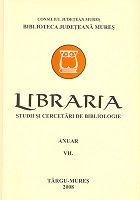Congresul studenţesc de la Târgu-Mureş din 1936 (I)
Student’s Congres from Târgu-Mureş in 1936
Author(s): Alina FoktSubject(s): Political history, Social history, Recent History (1900 till today), Nationalism Studies, Interwar Period (1920 - 1939)
Published by: Biblioteca Județeană Mureș
Keywords: Iron Guard; Târgu-Mureş; Students’ Congress; nationalism; legionary movement;
Summary/Abstract: The Iron Guard, as an extremist movement of right-wing political orientation, had arised in a political climate based on immorality and corruption. Undertaking a messianic role, it has been extremely tempting for both the underprivileged from villages and towns and for the renown intellectuals. Seen as a peril to Romanian democracy, that has been quite fragile, the Iron Guard has been permanently watched by the authorities. The legionary movement had found a favourable area to expand itself in the entire Transylvanian space; in Mureş county, the villages were most on the row. We can explain this phenomenon of spreading the legionary ideas in Transylvania, after 1935, as a reaction to Hungarian revisionism. In April 1936, the legionaries have organised a national congress at Târgu-Mureş, that has been strongly criticised by some politicians. In the Northern part of Transylvania, that has changed its political statute after the Diktat from Vienna, in 1940, the legionary movement has registered a revulsion, after the territory that has been given away turned back to Romania. But this time, it was on different terms.
Journal: Libraria. Studii și cercetări de bibliologie
- Issue Year: VII/2008
- Issue No: 7
- Page Range: 258-269
- Page Count: 12
- Language: Romanian

